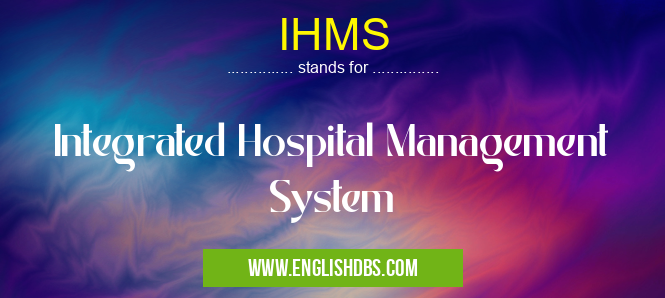What does IHMS mean in HOSPITALS
Integrated Hospital Management System (IHMS) is a comprehensive software solution designed to streamline and optimize various aspects of hospital operations. It offers a centralized platform for managing clinical, administrative, and financial functions, enabling hospitals to improve efficiency, reduce costs, and enhance patient care.

IHMS meaning in Hospitals in Medical
IHMS mostly used in an acronym Hospitals in Category Medical that means Integrated Hospital Management System
Shorthand: IHMS,
Full Form: Integrated Hospital Management System
For more information of "Integrated Hospital Management System", see the section below.
Key Features of IHMS
- Patient Management: Patient demographics, medical history, appointments, and billing information are centralized in one system.
- Clinical Workflow: Electronic health records (EHRs), prescription management, and clinical decision support tools enhance patient care and reduce medical errors.
- Administrative Management: Staff scheduling, inventory control, and purchasing are automated, improving efficiency and reducing administrative overheads.
- Financial Management: Billing, revenue cycle management, and financial reporting are integrated, providing real-time financial insights.
- Interoperability: IHMS can integrate with other hospital systems and external applications, facilitating data exchange and enhancing collaboration.
Benefits of IHMS
- Improved Patient Care: Centralized patient records and clinical tools enable better diagnosis, treatment planning, and medication management.
- Increased Efficiency: Automated workflows and centralized data management reduce administrative tasks and free up staff for patient care.
- Enhanced Collaboration: Integrated communication and information sharing foster collaboration among medical teams and departments.
- Reduced Costs: Automated processes and improved efficiency lead to reduced operating and administrative costs.
- Better Decision-Making: Real-time data and analytics provide hospital administrators with insights for informed decision-making.
Essential Questions and Answers on Integrated Hospital Management System in "MEDICAL»HOSP"
What is the purpose of an Integrated Hospital Management System (IHMS)?
An IHMS is a comprehensive software system that streamlines and integrates various aspects of hospital operations, including medical records, patient scheduling, billing, and inventory management. It aims to improve efficiency, reduce errors, and enhance patient care by providing a centralized platform for managing hospital data and processes.
What are the key benefits of implementing an IHMS?
Implementing an IHMS offers several benefits, including:
- Improved efficiency and automation of tasks, reducing manual labor and saving time.
- Enhanced patient care by providing real-time access to patient data and facilitating communication among healthcare providers.
- Improved financial performance by optimizing billing and revenue cycle management.
- Reduced errors and improved compliance by standardizing processes and automating data entry.
- Increased patient satisfaction through improved communication and reduced wait times.
What are the different modules typically included in an IHMS?
Common modules found in IHMSs include:
- Electronic Health Records (EHR)
- Patient Scheduling
- Billing and Revenue Cycle Management
- Inventory Management
- Human Resources
- Financial Management
- Supply Chain Management
- Decision Support Tools
How can hospitals evaluate different IHMS solutions?
Hospitals should consider the following factors when evaluating IHMS solutions:
- Functionality and features that meet their specific needs.
- Scalability to accommodate future growth and changes in healthcare regulations.
- Ease of use and user adoption among staff.
- Integration capabilities with existing systems and technologies.
- Vendor reputation, support, and implementation experience.
- Total cost of ownership, including hardware, software, maintenance, and training.
What are the challenges associated with implementing an IHMS?
Hospitals may encounter challenges during IHMS implementation, such as:
- Data migration and integration from legacy systems.
- Training and adoption by staff who may be resistant to change.
- Interoperability issues with other systems and technologies.
- Ensuring data security and compliance with regulations.
- Managing ongoing updates and maintenance.
Final Words: IHMS plays a crucial role in modern healthcare delivery, enabling hospitals to improve operational efficiency, enhance patient care, and reduce costs. By integrating various aspects of hospital management into a single platform, IHMS empowers hospitals to deliver better healthcare services to their patients.
